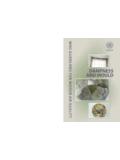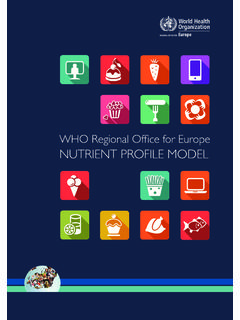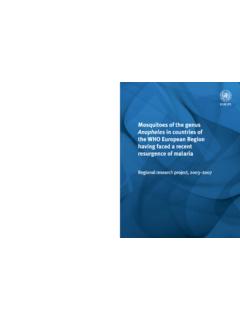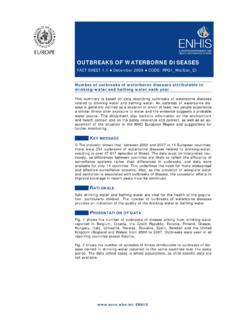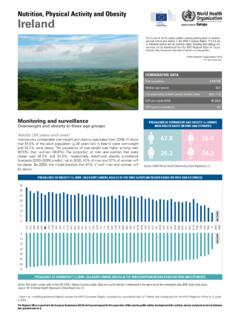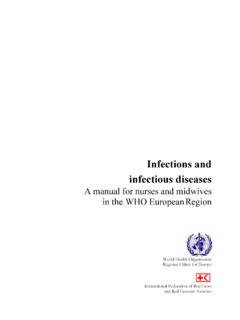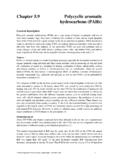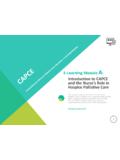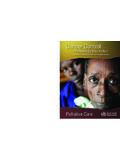Transcription of EN: Better palliative care for older people - WHO/Europe
1 Better palliative care for older people The European The Open Society King's College The European Association of Institute Network London Institute of palliative care Public Health Oncology Programme World Health Organization Regional Office for Europe Scherfigsvej 8, DK-2100 Copenhagen , Denmark Telephone: +45 39 17 17 17. Fax: +45 39 17 18 18. E-mail: Web site: FONDAZIONE FLORIANI. ABSTRACT. Most deaths in European and other developed countries occur in people aged over 65, but relatively little health policy concerns their needs in the last years of life. As life expectancy increases, the number of people living to older ages is also increasing in many countries. At the same time, the relative number of people of working age is declining and the age of potential caregivers is increasing. palliative care is therefore of growing public health importance.
2 older people have traditionally received less palliative care than younger people and services have focused on cancer. This booklet is part of the WHO Regional Office for Europe's work to present evidence for health policy- and decision-makers in a clear and understandable form. It presents the needs of older people , the different trajec- tories of illnesses they suffer, evidence of underassessment of pain and other symptoms, their need to be involved in decision-making, evidence for effective palliative care solutions, and issues for the future. A companion booklet entitled palliative care - the solid facts considers how to improve services and educate professionals and the public. Acknowledgements for photographs Front cover: Bicycle at a cathedral by Professor Joan Teno, Brown University, USA. We thank the following for submitting other photographs included throughout the booklet: Paolo Barone, Militello in Val di Catania (CT), Italy Dr Elizabeth Davies, King's College London, UK.
3 Mr Peter Higginson, UK. Professor Anica Jusic, Regional Hospice Centre Volunteer Service, Croatian Society for Hospice palliative care and Croatian Association of Hospice Friends Macmillan Cancer Relief, London, UK. Professor Joan Teno, Brown University, USA. Davide Zinetti, Milan, Italy Lithographic, printing and page make up Tipolitografia Trabella Srl - Milan, Italy Better palliative care for older people Edited by Elizabeth Davies and Irene J Higginson Supported by the Floriani Foundation With the collaboration of: The European Association The Open Society Institute King's College London The European Institute of palliative care Network Public Health Programme of Oncology KEYWORDS older people . GERIATRIC MEDICINE. END OF LIFE care . DEATH AND DYING. palliative care . PUBLIC HEALTH. LIFE-THREATENING ILLNESS.
4 SERIOUS CHRONIC ILLNESS. SUPPORTIVE care . TERMINAL care . ISBN 92 890 1092 4. Address requests about publications of the WHO Regional Office to: by e-mail (for copies of publications). (for permission to reproduce them). (for permission to translate them). by post Publications WHO Regional Office for Europe Scherfigsvej 8. DK-2100 Copenhagen , Denmark World Health Organization 2004. All rights reserved. The Regional Office for Europe of the World Health Organization welcomes requests for permission to reproduce or translate its publications, in part or in full. The designations employed and the presentation of the material in this publication do not imply the expression of any opinion whatso- ever on the part of the World Health Organization concerning the legal status of any country, territory, city or area or of its authorities, or concerning the delimitation of its frontiers or boundaries.
5 Where the designation country or area appears in the headings of tables, it covers countries, territories, cities, or areas. Dotted lines on maps represent approximate border lines for which there may not yet be full agreement. The mention of specific companies or of certain manufacturers' products does not imply that they are endorsed or recommended by the World Health Organization in preference to others of a similar nature that are not mentioned. Errors and omissions excepted, the names of proprietary products are distinguished by initial capital letters. The World Health Organization does not warrant that the information contained in this publication is complete and correct and shall not be liable for any damages incurred as a result of its use. The views expressed by authors or editors do not necessarily represent the decisions or the stated policy of the World Health Organization.
6 CONTENTS. Contributors 5. Foreword 6. Preface 7. Introduction 8. 1. Why palliative care for older people is a public health priority 10. Ageing populations The changing epidemiology of disease The increasing age of caregivers Financial implications for health care systems The range of settings for care 2. palliative care : the needs and rights of older people and their families 14. palliative care The needs of older people at the end of life The needs of caregivers A new way of looking at palliative care Autonomy and choice Preferences for place of care and death 3. Evidence of underassessment and undertreatment 20. Underassessment of pain Lack of information and involvement in decision-making Lack of home care Lack of access to specialist services Lack of palliative care within nursing and residential homes 4.
7 Evidence of effective care solutions 26. palliative care skills of individual health professionals Providing holistic care Coordinating care across different settings Supporting families and caregivers Specialist palliative care Developing palliative care services for non-cancer patients Advanced care planning Generalizability of findings 5. The challenge for health policy- and decision-makers 32. The challenge Evidence for effective care solutions Barriers to overcome Potential solutions: a public health policy approach Ensuring palliative care is integral to health services Improving the application of palliative care skills across all settings Identifying gaps in the research base 6. Recommendations 36. 3. The World Health Organization was established in WHO Centre for Urban Health 1948 as a specialized agency of the United Nations This publication is an initiative of the Centre for serving as the directing and coordinating authority Urban Health, at the WHO Regional Office for for international health matters and public health.
8 Europe. The technical focus of the work of the One of WHO's constitutional functions is to provide Centre is on developing tools and resource materi- objective and reliable information and advice in the als in the areas of health policy, integrated planning field of human health, a responsibility that it fulfils for health and sustainable development, urban in part through its publications programmes. planning, governance and social support. The Through its publications, the Organization seeks to Centre is responsible for the Healthy Cities and support national health strategies and address the urban governance programme. most pressing public health concerns. The WHO regional Office for Europe is one of six regional offices throughout the world, each with its own programme geared to the particular health problems of the countries it serves.
9 The European Region embraces some 870 million people living in an area stretching from Greenland in the north and the Mediterranean in the south to the Pacific shores of the Russian Federation. The European programme of WHO therefore concentrates both on the problems associated with industrial and post-industrial society and on those faced by the emerging democracies of central and eastern Europe and the former USSR. To ensure the widest possible availability of author- itative information and guidance on health matters, WHO secures broad international distribution of its publications and encourages their translation and adaptation. By helping to promote and protect health and prevent and control disease, WHO's books contribute to achieving the Organization's principal objective the attainment by all people of the highest possible level of health.
10 4. CONTRIBUTORS. Professor Janet Askham Dr Karl Lorenz King's College London, Veterans Administration Health care System, London, United Kingdom Los Angeles, CA, USA. Dr Elizabeth Davies Dr Joanne Lynn King's College London, Washington Home Center for London, United Kingdom palliative care Studies and RAND Health, Washington, DC, USA. Dr Maril ne Filbet Hospices Civils, CHU de Lyon, Professor Martin McKee Lyon, France London School of Hygiene and Tropical Medicine, London, United Kingdom Dr Kathleen M Foley Memorial Sloan-Kettering Cancer Center, Professor Charles-Henri Rapin New York, NY, USA Poliger, H pitaux Universitaires de Gen ve Geneva, Switzerland Professor Giovanni Gambassi Centro Medicina Invecchiamento Professor Miel Ribbe Universit Cattolica del Sacro Cuore VU University Medical Centre, Rome, Italy Amsterdam, Netherlands Professor Irene J Higginson Dr Jordi Roca King's College London, Hospital de la Santa Creu, London, United Kingdom Barcelona, Spain Professor Claude Jasmin Professor Joan Teno H pital Paul Brousse, Brown Medical School, Villejuif, France Providence, RI, USA.
